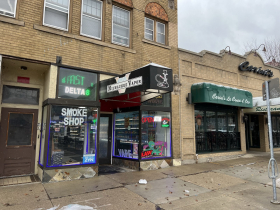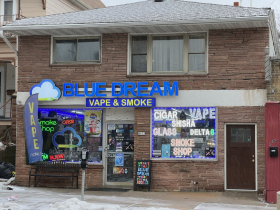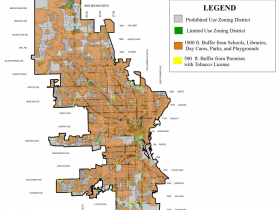Milwaukee Will Ban Most New Vape Shops
City zoning code change aims to deter teens from using tobacco.

A female vapes with her JUUL e-cigarette. Photo by Sarah Johnson, CC BY 2.0 via Wikimedia Commons
It’s going to be very difficult to open a new electronic cigarette (vape) store in Milwaukee. A new zoning framework would substantially limit where new stores could open, adding prohibitions based on proximity to schools, parks and childcare centers.
Only a handful of intersections or commercial corridors would be eligible for new stores.
It’s a change advocates hope will reduce the number of people, particularly teenagers, that use the often-flavored tobacco products. A 2022 FDA survey found that 14% of high school students and 3.3% of middle school students reported using vape products in the past 30 days.
“I think it’s good policy and it will make Milwaukee a better place,” said Alderman Jonathan Brostoff to the Zoning, Neighborhoods & Development Committee Tuesday.
Earlier this year, Brostoff led the charge for a six-month moratorium on new stores. He said he was motivated to seek the change given the proliferation of the stores and the harmful impacts of tobacco usage. The new zoning regulations, pending before the Common Council, are written with an eye to withstand any legal challenges.
“Public health impacts we believe build the necessary public record that undergirds this work,” said Department of City Development planning manager Sam Leichtling.
“In our research, we studied the specific impacts of tobacco and e-cigarette land use,” said DCD graduate intern Sydney Swift. “What we found is that there are significant negative health impacts from these retailers.” She said point-of-sale marketing tactics have been found to have a great impact on young people and are notable when the retailers are clustered together.
There is a perceived racial component of the marketing by the e-cigarette companies.
“This is a very hot-button item,” said Fire Chief Aaron Lipski. “This is a focused attempt by retailers of these items to target Black and Brown communities where we also have our highest fire risk and incidents of fire. And these devices are inextricably linked to so many fire causes in Milwaukee and across the nation.”
The new regulations would prohibit stores from opening within 1,000 feet of an elementary or secondary school, library, daycare center, park or playground. Stores would need to receive special approval from the Board of Zoning Appeals if they are proposed within 500 feet of an existing tobacco license holder. In addition to the proximity restrictions, stores could only open in areas with commercial, downtown or “Industrial – Mixed” zoning designations.
The net result is only a handful of areas in Milwaukee in which stores could open. Eligible areas include portions of S. Howell Ave. and E. Layton Ave. near Milwaukee Mitchell International Airport, the northern tip of Walker’s Point, part of the Midtown Center shopping complex, the intersection of N. 76th St. and W. Brown Deer Rd. and a portion of N. 76th St. just north of W. Good Hope Rd.
The restrictions would apply to stores that dedicate at least 10% of their floor space to e-cigarette sales or more than 10% of their stock consists of tobacco or e-cigarette products.
The regulations wouldn’t apply to existing retailers that already qualify under the 10% threshold. If a retailer is shuttered for more than a year it would lose its grandfathered status.
A number of community members, including teens, also spoke in favor of the proposal, including many affiliated with UMOS. The Hispanic-focused organization’s prevention coordinator Aaliyah Torres said the companies deliberately flavor the products to taste like candy. She said anti-tobacco coalition Wisconsin Wins has done 164 compliance checks on retailers since October, with 42 retailers (26%) selling to youth.
“The restrooms have become smoke rooms,” said pastor Steven Tipton of high schools.
As part of a $1.2 billion, multi-party settlement involving teen-focused marketing practices by e-cigarette maker JUUL Labs, the City of Milwaukee will receive $2.47 million to fund anti-smoking efforts.
Ald. Michael Murphy lamented that the Wisconsin State Legislature has limited the city’s ability to further ban e-cigarette sales. “They support local control as long as it doesn’t affect individuals that contribute to their campaign coffers,” he said.
The full council is expected to vote on the proposal on June 20.
In addition to Brostoff, the zoning change is co-sponsored by Marina Dimitrijevic, Murphy, Lamont Westmoreland, Mark Chambers, Jr., JoCasta Zamarripa, Robert Bauman and Russell W. Stamper, II.
The city has followed the moratorium-to-zoning-restriction pathway before. In 2010, under a proposal led by then-alderman Terry Witkowski, the council enacted a moratorium on cash-for-gold stores to allow a land-use framework to be developed.
Photos and Zoning Restriction Map
Legislation Link - Urban Milwaukee members see direct links to legislation mentioned in this article. Join today
If you think stories like this are important, become a member of Urban Milwaukee and help support real, independent journalism. Plus you get some cool added benefits.
Related Legislation: File 230097
Political Contributions Tracker
Displaying political contributions between people mentioned in this story. Learn more.
- March 28, 2016 - Michael Murphy received $100 from Terry Witkowski
- November 19, 2015 - Robert Bauman received $50 from Terry Witkowski




























So how did the new vape shop on the southwest corner of Locust and Murray, where the bicycle shop had been for many years, get to open recently?